| Srl | Item |
| 1 |
ID:
121007


|
|
|
|
|
| Publication |
2012.
|
| Summary/Abstract |
This article exploits newly-released archival materials to survey and assess the course and impact of Stalin's repression of the late 1930s on the command cadre of the Siberian Military District.
|
|
|
|
|
|
|
|
|
|
|
|
|
|
|
|
| 2 |
ID:
121005
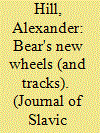

|
|
|
|
|
| Publication |
2012.
|
| Summary/Abstract |
Using a range of Soviet archival sources and memoirs this article examines the contribution made by US-supplied tanks and other armored and unarmored vehicles to the Soviet war effort, focusing on examples in Soviet archival photographs reproduced alongside the text.
|
|
|
|
|
|
|
|
|
|
|
|
|
|
|
|
| 3 |
ID:
121003
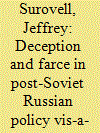

|
|
|
|
|
| Publication |
2012.
|
| Summary/Abstract |
Of all the assumptions pervading the conventional wisdom about Russian foreign policy few have been more universally accepted than Russia's supposed opposition to NATO expansion. Because Russia's principal source of profit has come from rental value of natural resources from the world market, Russia's foreign policy has largely been conducted in the interests of the exporters of those resources. Compliance with NATO expansion, Moscow's decision-makers apparently believe, can only promote the pecuniary interests of that group. Given this dynamic, and confirmed by an examination of the historical record, I conclude that Moscow's leaders have acquiesced to and even supported NATO expansion.
|
|
|
|
|
|
|
|
|
|
|
|
|
|
|
|
| 4 |
ID:
121002


|
|
|
|
|
| Publication |
2012.
|
| Summary/Abstract |
This analysis focuses on the three "Visegrad" states who became members of NATO in 1999: Hungary, Poland and the Czech Republic. We assess the degree of diplomatic and military support provided to the alliance by the Visegrads during NATO's military strikes on Libya. Our findings suggest that these states contributed essentially nothing to the military operation, despite calls for assistance from some contributing NATO allies. This abstention from Operation Unified Protector has larger political implications for NATO, including serious political damage to the Visegrads themselves, who now suffer more meaningfully from the free-rider critique.
|
|
|
|
|
|
|
|
|
|
|
|
|
|
|
|
| 5 |
ID:
121001
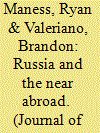

|
|
|
|
|
| Publication |
2012.
|
| Summary/Abstract |
The steps-to-war theory has made important strides in uncovering the causes of interstate armed conflict. Scholars now have a reliable way to delineate the path to war or towards peace. This article explores the relationship between Russia and its 'Near Abroad' neighbors Estonia, Ukraine, and Georgia to investigate the probability of war and conflict in the region during the post-Cold War era. Here, we create a risk barometer for war by combining recent empirical findings with qualitative foreign policy analysis. The analysis demonstrates Estonia's probable successful path out of war with Russia, while the Ukraine's growing risk for coming conflict increases as the variables of interest pile on. Georgia and Russia have already had a war that followed the path outlined in the theory and might battle again in the future based on our findings. This article demonstrates how an empirical theory of international relations behavior can be used to explore the potential for future conflict in the region so as to inform policy analysis.
|
|
|
|
|
|
|
|
|
|
|
|
|
|
|
|
| 6 |
ID:
121006
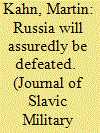

|
|
|
|
|
| Publication |
2012.
|
| Summary/Abstract |
An understanding of why almost all Anglo-American Government officials believed in a Soviet defeat as a result of a German attack can be reached by analyzing US and British Government sources (State Department, Foreign Office, Military, and other) from 1939-41. The sources reveal much detail about the perceived weakness of Soviet war potential, and in what specific respects the Anglo-Americans underestimated Soviet strength. The assessments were in most cases far from reality and as much about economic shortcomings as about military weakness.
|
|
|
|
|
|
|
|
|
|
|
|
|
|
|
|
| 7 |
ID:
121004
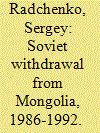

|
|
|
|
|
| Publication |
2013.
|
| Summary/Abstract |
This article details Soviet military withdrawal from Mongolia between July 1986, when the first announcement was made of a partial withdrawal and December 1992, when the last detachment of Soviet servicemen crossed the Russian-Mongolian border. The author shows that the decision to withdraw forces from Mongolia was made in Moscow, part and parcel of Mikhail Gorbachev's policy aimed at achieving rapprochement with the People's Republic of China. The Mongols only grudgingly went along, fearful of being left defenseless before China. It was not until 1989 that the Mongolian leadership evidenced serious interest in the departure of Soviet troops; when they did, it was partly a response to the build-up of nationalist sentiment prompted by greater openness and democratization, as well as a function of Mongolia's efforts to find for itself a new role on the international stage. The author argues that the Soviet departure was hasty, ideologically charged, and poorly thought out. Maintaining a token force in Mongolia would have allowed Russia to retain a degree of influence in the country over the long term without serious negative consequences for Russian-Mongolian relations.
|
|
|
|
|
|
|
|
|
|
|
|
|
|
|
|